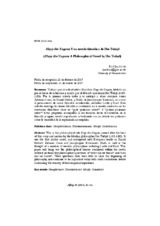Hayy ibn Yaqzan: Una novela filosófica de Ibn Tufayl
Hayy ibn Yaqzan: A Philosophical Novel by Ibn Tufayl
Autor
Jackson, Roy
Editor
UCOPressFecha
2017Materia
NeoplatonismoIluminacionismo
Marifa
Orientalismo
Neoplatonist
Illuminationist
Marifa
Orientalist
METS:
Mostrar el registro METSPREMIS:
Mostrar el registro PREMISMetadatos
Mostrar el registro completo del ítemResumen
Trabajo que aborda el relato filosófico Hayy ibn Yaqzan, titulado así por el héroe de la historia y escrito por el filósofo musulmán Ibn Tufayl (1105-1185). Fue la primera novela árabe y se anticipó a obras europeas como Robinson Crusoe, de Daniel Defoe, y Emile, de Jean-Jacques Rousseau, así como al pensamiento de varios filósofos occidentales, incluidos Locke y Kant. Este artículo investiga los temas filosóficos contenidos en la novela, centrados en las cuestiones filosóficas clave de “¿qué podemos saber?” Y “¿cómo podemos saber?” Estas preguntas acompañan al ser humano desde el comienzo de la filosofía y siguen siendo importantes actualmente con un debate tan polémico sobre la veracidad de la experiencia no empírica. This is the philosophical tale Hayy ibn Yaqzan, named after the hero of this story and written by the Muslim philosopher Ibn Tufayl (1105-1185). It was the first Arabic novel, and anticipated such European works as Daniel Defoe’s Robinson Crusoe and Jean-Jacques Rousseau’s Emile, as well as the thought of a number of western philosophers including Locke and Kant. This paper will bring out the philosophical themes contained within the novel, centred on those key philosophical questions of ‘what can we know?’ and ‘how can we know?’. These questions have been with us since the beginning of philosophy and continue to be important today with such contentious debate concerning the veracity of non-empirical experience.

